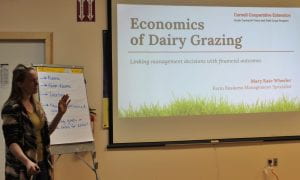As the team’s Farm Business Management Specialist, my goal is to equip producers with knowledge and skills that they can apply to strengthen their business operations and improve profitability. Any decision that a farm manager makes can be analyzed within the context of “how will this decision affect farm profitability?” On a dairy farm, profitability is driven by four variables: the milk price, the cost of producing milk, the total volume of milk production, and the total amount invested in the business.
Holding all else constant, profitability goes up if the milk price or the volume increases (assuming the milk price is greater than the cost of production), and profitability goes down if the cost of production or the investment level rises. Despite the simplicity of this model, any change on the farm has the potential to influence multiple variables in this equation, making it complicated to discern the impact on profitability. To make good business decisions, farm managers must have good systems in place to gather and analyze financial information. Farmers participate in our business management programming to enhance their knowledge of record keeping systems and farm accounting principles, and improve their financial analysis skills.
Record Keeping
For the second year in a row, we offered a QuickBooks for Farmers class in partnership with SCORE Syracuse. The course blends instruction on farm accounting principles with step-by-step demonstrations of how to record transactions using QuickBooks software. During the class, each student practiced entering transactions on their own individual laptop, providing hands-on experience to reinforce the classroom instruction.
Eight people from seven farms attended this 4-week class, held at the Career Work Center in Cortland. By holding the class in January, we introduced farmers to new record keeping skills and tools right at the time of year when many are considering updates to their recordkeeping system.
As a direct result of this program, two farms who already used QuickBooks reported making improvements to their existing record keeping systems, three farms purchased QuickBooks software to use for farm record keeping in 2020. With additional support from our team, one producer applied for, and received, a Dairy Advancement Program Recordkeeping Systems Grant to support purchase and implementation of QuickBooks on their farm.
Financial Analysis
The Dairy Farm Business Summary (DFBS) is an incredible tool that dairy operators can use to track the annual performance of their business. The DFBS is highly detailed, and it requires a tremendous amount of financial and production data to participate. Working with farms to complete the DFBS involves education on record keeping systems and principles of farm accounting, including cash versus accrual accounting.
Once a farm has completed the DFBS, we train them to read and interpret their financial statements and performance indicators. Each participating farm receives a detailed individual report, which provides a thorough snapshot of the past year’s performance, and compares it to previous years. This annual “report card” serves as a jumping off point for big-picture discussions about farm goals, challenges, and opportunities.
In January and February of 2020, I worked with nine farms to complete their 2019 DFBS. Eight of these farms were not participating in the DFBS when I joined the team in 2017, and two of them were completely new to the DFBS this year. All those that participated in the DFBS increased their knowledge of their own farm’s financial performance, and most have implemented management changes as a result. Five farms made significant changes to improve their record keeping systems as we worked through the DFBS together.
It is important to note that the benefits of participation in the DFBS accrue to the industry as a whole, not just participating farms. There is a strong applied research component to the DFBS, as PRO-DAIRY staff analyze the statewide DFBS data and generate public reports summarizing the state of the dairy industry. These extension bulletins are available to all farms, whether or not they participate. The data from our nine participating farms strengthen the statewide summary and ensure that farms in our region are represented in the published DFBS reports.
Benchmarking
Benchmarking is the process of comparing one farm’s performance to a set of internal or external indicators. Internal benchmarking shows change over time within one business, while external benchmarking compares one farm to a group of peers. External benchmarking in a peer-to-peer discussion group setting is an incredibly powerful tool for educating producers about the relationship between different management choices and financial outcomes.
Following a request for benchmarking from an organic dairy farmer in our region, we established an Organic Dairy Discussion Group with 6 farms in July 2019. This program follows PRO-DAIRY’s Dairy Profit Discussion Group structure, and was the first in New York State to receive a Dairy Advancement Program (DAP) Peer-to-Peer Strategic Focus Group grant, which provided $7,500 to support the program. In preparation for our second meeting, we recruited 2 additional farms from our 6-county region, collaborated with another Farm Business Management Specialists to identify 2 more farms from outside our region. A total of 10 farms participated in our second meeting in March 2020.
By bringing seven new organic dairies into the DFBS over the past two years, our efforts to develop a discussion group program to meet the demands of producers in our region will end up benefiting organic dairies across the state. We expect there will be enough organic dairies participating in the 2019 DFBS for PRO-DAIRY to generate comparison reports and publish benchmark data for the NY organic dairy sector, for the first time in years. As a result, the Dairy Farm Business Summary will delivering greater benchmarking value to the organic dairies that do participate, and offering a stronger incentive for new organic dairies to get involved going forward.


